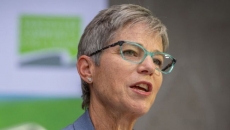Fewer than half of Canadians believe the federal government's plan to regulate social media sites will make platforms safer, a new survey suggests.
Polling firm Leger recently asked Canadians about the Liberal government's proposed Online Harms Act, which contains a suite of measures meant to make social media platforms safer, particularly for children.
Half of respondents said they are wary of the government's ability to protect free speech, and a majority said they support the controversial proposal to introduce stiffer sentences for hate speech crimes.
Introduced by Justice Minister Arif Virani, the proposed legislation would create a new digital safety commission to regulate social media companies and establish an ombudsperson to hear complaints from Canadians. The law would also require companies to create safety plans to mitigate exposure to harmful content.
.@KidsHelpPhone is a lifeline for kids in crisis, when they feel they have nowhere else to turn. Today, @KathyHay & I chatted about their firsthand experience dealing with the devastating consequences of online harms and how our Bill will #ProtectKidsOnline. pic.twitter.com/M5qKf6bzHF
— Arif Virani (@viraniarif) March 13, 2024
The bill targets seven types of online content it defines as harmful, ranging from terrorist material to content that encourages a minor to commit self-harm.
The legislation outlines that platforms will have 24 hours to remove sexual content, like intimate images shared without consent and child sex abuse images, once it is flagged.
The regulator would have the power to levy millions of dollars worth of fines against platforms that don't comply with the rules.
Leger surveyed 1,527 Canadians about the proposed measures from March 8 to 10. Online surveys cannot be assigned a margin of error because they are not considered truly random samples.
Nearly 70 per cent of respondents said they support the government's overall plan to regulate online content, while 25 per cent said they disagreed with the move.
But only 41 per cent of respondents said they believe the legislation will actually create safer online platforms, including making it easier to remove sexual abuse images. Another 32 per cent said they do not think that will be the result.
When asked whether they trust the federal government to regulate online content in a way that protects individual free speech, only a small minority — 10 per cent — said they "completely trust" the government.
Another 33 per cent answered they "somewhat trust the government," while 27 per cent said they "do not trust at all" and 23 per cent answered they "barely trust" the government to protect free speech.
Around 20 per cent of those surveyed said they most trust the federal Conservatives to regulate material, with 17 per cent of respondents choosing Prime Minister Justin Trudeau's Liberals and only 13 per cent choosing the federal New Democrats.
Conservative Leader Pierre Poilievre has been a staunch critic of the government's plan to regulate the online space, including previous laws aimed at regulating streaming platforms and forcing big tech companies to compensate news agencies.
When it comes to the online harms legislation, Poilievre has toned down his criticism significantly, saying he believes children should be protected from online dangers by police and the courts and not "pushed off to a new bureaucracy."
Critics of the legislation have focused much of their attention on the proposal to stiffen sentences for those convicted of hate propaganda offences, increasing the penalty to five years behind bars instead of the current two.
It also seeks to give judges the option to sentence individuals to life imprisonment if found guilty of advocating genocide — a measure that the Canadian Civil Liberties Association said could risk chilling free speech and disrespect sentencing principles of proportionality.
Virani and Justice Department officials have defended that proposal, saying it would only apply to the most extreme circumstances and underlining that judges have discretion when it comes to sentencing.
Seventy-two per cent of survey respondents said they agree with the stiffer punishments, while only 15 per cent said they disagree and 13 per cent said they don't know.
A majority of respondents also said they support the government's proposal to reinstate a section of the Canadian Human Rights Act that would allow individuals or groups to bring forward complaints of online hate speech.
Critics have warned that reintroducing a version of the section that was removed when Stephen Harper's former Conservative government was in power could lead to a torrent of false claims and create a chilling effect on speech.
Justice Department officials have tried pushing back against such concerns, saying speech would have to portray a group as "inherently violent" or "unhuman" to be probed by a human rights tribunal. The bill would allow the tribunal to order that content taken down or award a victim up to $50,000 in damages.





